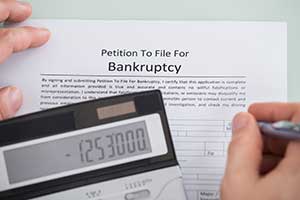
When you file for bankruptcy in Ohio, you want your debts to be discharged — eliminated — so that you can receive a fresh financial start. However, there are times when situations change, and you no longer wish to continue with the bankruptcy, or you made mistakes or have problems, and your case winds up being dismissed and ended without discharge by the court.
If your bankruptcy case is dismissed, it will still appear on your credit report. A bankruptcy will typically stay on your credit report for 7-10 years. You may have to wait 180 days before you can file for bankruptcy again; and if you refile, both bankruptcy cases will appear on your credit report.
The skilled and seasoned Ohio bankruptcy attorneys at Fesenmyer Cousino Weinzimmer understand that financial problems can happen to even the most well-intentioned people. We offer a free initial consultation to evaluate your financial situation to see if bankruptcy is your best option. We look at your income, your debts and your goals and develop a financial recovery plan that’s best for you. If bankruptcy is the answer, we make sure it is done correctly so you won’t wind up with a bankruptcy that is dismissed, unless you want it to be.
Why Bankruptcies are Dismissed
Bankruptcies are dismissed for three main reasons — voluntary dismissal, dismissal for cause, and dismissal for bad faith or abuse.
1) Voluntary Dismissal
You may voluntarily ask the bankruptcy court to dismiss your bankruptcy case for a variety of reasons. For example, you may unexpectedly receive money and want to use it to improve your credit. This is usually not a good idea; bankruptcy dismissals may actually worsen your credit score because the filing remains on your credit reports. It is usually better to get the discharge of bankruptcy and then discuss with your bankruptcy attorney whether you can keep the money received.
If you have filed for Chapter 7 bankruptcy, you would need to show cause for voluntary dismissal, and the courts would decide whether or not to grant it. If you have filed for Chapter 13, you have the right to ask for dismissal at any time.
In general, the courts will look at the overall benefit of dismissal to both debtor and creditors. In making its decision as to whether to grant a voluntary dismissal, the courts will consider factors such as whether:
- all creditors consent or there is some objection;
- you are acting in good faith;
- the dismissal would result in a prejudicial delay in payment, or a reordering of priorities; and
- there is another way to handle the payment of claims.
2) Dismissal for Cause
Once you have filed for bankruptcy you must comply with all Ohio Bankruptcy court orders or your case will be dismissed. Cases under all chapters of bankruptcy can be dismissed for cause if you do not meet specific requirements for properly filling out forms, producing required documents, and meeting timetables. Other major reasons for dismissal include:
- Failing to meet eligibility requirements. If you file for Chapter 7 bankruptcy, you must not make more money than allowed under the Ohio “means test” that looks at your income and expenses. If you cannot pass the means test, your case will be dismissed, but filing for Chapter 13 may still be an option.
- Failing to pay court filing fees. You must pay a filing fee to start a bankruptcy case or obtain a court-approved fee waiver or an installment plan if you can’t afford the fee.
- Providing incorrect financial information. You must disclose all of your income, assets, debts, and recent financial transactions to the court. If you fail to do so, leave out information, or make mistakes, the court will dismiss your case.
- Failing to complete the pre-bankruptcy credit counseling class.You must complete an approved Ohio credit counseling class within the 180 days before your bankruptcy filing and file a certificate stating that you took this class.
- Not appearing at the creditors’ meeting. In both Chapter 7 and Chapter 13 bankruptcy, you must attend a hearing with your creditors in front of the bankruptcy trustee.
- Not making your Chapter 13 plan payments. If you are filing for Chapter 13 bankruptcy, you must make the agreed-upon payments to the bankruptcy trustee for three to five years. If you get behind in payments, you must make alternative arrangements with the bankruptcy trustee to catch up.
3) Dismissal for Bad Faith, Fraud and Abuse
Your case may be dismissed if you show bad faith by not cooperating with the court or performing required duties, or if your case does not comply with law. If you are found to be committing bankruptcy fraud in any way, such as misrepresenting or not disclosing all of your income, debts and assets, your case will be dismissed. In addition, you may be subject to criminal or civil penalties, including fines, a ban on future bankruptcy filings, and jail.
If your dismissal was based on fraud, the court will likely bar you from getting a bankruptcy discharge again for a certain period of time. In some cases of bad faith, the court may dismiss a case with prejudice, preventing the discharge of debts in the dismissed case in a later bankruptcy. In addition, the court is also able to dismiss a case on its own motion if it believes that the debtor is abusing the process.
What if my case is dismissed?
If your case is dismissed, you may usually start over by refiling for bankruptcy.. You will have to know the reasons for dismissal and then rectify all the errors that led to it, unless the reason was for fraud and you are not allowed to file again for a period of time.
If you are refiling for Chapter 13, you will have to qualify again. If you refile for Chapter 7 after a previous Chapter 13 case was dismissed, you may not be able to keep secured property you would have been able to keep under Chapter 13.
Contact Us and Get Help
Bankruptcy laws are complicated, and even a small mistake could result in an involuntary dismissal of your case. In addition, a bankruptcy that is not filed properly can leave you stuck with unexpected expenses and debts that are not resolved, or even with charges of fraud.
The experienced bankruptcy lawyers at Fesenmyer Cousino Weinzimmer are dedicated to helping you through the maze of personal bankruptcy so you can obtain financial freedom. A free initial consultation and careful evaluation of your individual financial situation will point you in the right direction and give you the information you need. We understand what you are going through and will walk you through the process to make sure your case is not dismissed.
Delaying can only worsen your situation, so call the Ohio bankruptcy attorneys at Fesenmyer Cousino Weinzimmer today! Call one of our conveniently located office branches at 614-228-4435 (Columbus), 937-222-7472 (Dayton), or 877-654-5297 (Cincinnati) or email for your free consultation so we can determine what debt relief solutions will work best for you.


